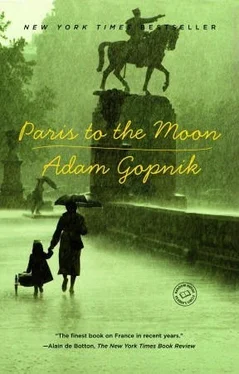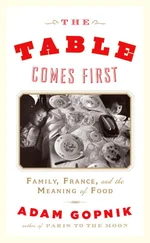The big game are themselves souvenirs of a hotter time in Deyrolle’s history, when hunters would have their African catches mounted and leave an extra lion or a leftover gnu to the house, as a sort of tip, like gamblers in Monte Carlo in the same period giving a chip or two to the croupier. The house makes its money now, Madame explains, mostly selling bugs and butterflies to decorators. “We can’t find any large game anymore,” she complains. “The laws are so absurdly tight. If a lion dies in a circus, we cannot touch it. If an elephant falls over in a zoo, we cannot reanimate it. Is it better for a thing of beauty to die and molder away than to be made a work of art?” (The government is worried, as governments will be, I suppose, that if fallen elephants are turned into merchandise, however lovely, then sooner or later elephants will not just be falling. Elephants will be nudged.)
Luke is as frightened (and fascinated) by the small game as he is by the large; he clings to me tightly throughout—and then every day demands to be taken back. I think he feels about it the same way that I feel about the Baudrillard seminar I am attending at the Beaubourg. It’s scary, but you learn something.
I’ve attended this public seminar, given by Baudrillard and friends at the Beaubourg. Jean Baudrillard is, or anyway was, the terror of West Broadway back in the eighties. He was the inventor of the theory of “the simulacra,” among much else, and famously insisted that “reality” had disappeared and that all that was left in its place was a world of media images and simulated events. (“The Gulf War Did Not Take Place” was his famous slogan, meaning that it was a pure television production.) Before the seminar I imagined Baudrillard as tall and spectral and high-domed as Barthes had been. He turns out to be a stocky, friendly little guy in his fifties, with a leather jacket and a weather-beaten complexion.
The seminar consists of a three- or four-man panel: an economist; a sociologist; Leo Scher, the all-around thinker. Each gives a presentation, and then Baudrillard comments. The other day, for instance, the economist was giving a lecture on exponentiality “Exponentiality is fatality,” he announced grimly, and went on to point out what every first-year biology student is told, that the “exponential” proliferation of biological life—each codfish has a million codfish children; each codfish child has a million of its own children—means that the codfish, or slime mold or antelope or, for that matter, French intellectuals, would cover the world in ten or so generations, unless there were something—several somethings—there to check them.
(The girl in front of me scribbled in her book, in French, of course, “Exponentiality is Fatality”)
“Therefore,” said the economist, “I propose that there must exist in the biological sphere a principle, which I will call the Regulon”—he wrote the word in capitals on the blackboard—“which prevents this from happening. I call this principle the Regulon.”
No one protested, or pointed out that, as I think is the case, Darwin (among many others) had solved this problem awhile ago without recourse to the Regulon. (Predators eat most of the cod-fish; the rest just die. Life is hard; the Regulon is called life, or death.) Baudrillard nodded gravely at the end of the exposition. But yours underlines the point I am making,” he added, almost plaintively He paused and then pronounced: “There is no Regulon in the Semiosphere.” (And she wrote it down and underscored it: “There is no Regulon in the Semiosphere.”)
There Is No Regulon in the Semiosphere. There is no way of stopping media signs from proliferating, no natural barrier to the endless flow and reproduction of electronic information, no way of keeping the CNN weatherman out of your sky. There is nothing to eat them. There Is No Regulon in the Semiosphere is a wildly abstract way of saying that there is no “natural predator” to stop the proliferation of movies and television; they do overwhelm the world, and with it reality. It is hard to see how you save the carousel and the musical horse in a world of video games, not because the carousel and musical horse are less attractive to children than the Game Boy, but because the carousel and the musical horse are single things in one fixed place and the video games are everywhere, no Regulon to eat them up.
When I lived here with my family, in the early seventies, there was nothing I liked more than walking up the boulevard Beau-marchais to the Cirque d’Hiver, the Winter Circus. It is a wooden octagon, visible from the boulevard, but set well back, on a little street of its own. A frieze, a kind of parody of the Pan-athenaic procession, runs around its roof: clowns and jugglers and acrobats in bas-relief. Inside, it has a hushed, intimate quality;
the hard wooden bleachers are pitched very high. I don’t recall that I ever actually went inside when I was a kid—I was too busy with movies—it just seemed like the right place to walk to. But now we’ve been to a winter circus at the Winter Circus. The Cirque du Soleil, from back home in Montreal, put on its slightly New Age show, and we took Luke and sat in the top rows. They brought the lights down when the circus began, as though it were a play, which struck me as an odd thing. I always think of circuses sharing the light of their spectators. What happened to the summer circus? I used to think that the circuses must have toured all summer and then came into winter retreat on the rue Amelot. But now I suspect that there was a summer circus once too, but they closed it. The Circus. Regulon got it, I guess.
It was a good circus, though a little long on New Age, New Vaudeville, and Zen acrobats and a little short, absent in fact, on the lions and bears I had promised Luke. (We have a standing joke about lions in Paris; as I push his poussette, I announce that I am terrified that there may be lions in this quarter of Paris—“and I’m so scared of lions”—and he roars, lustily.) At the end, though, the troupe took its final bow and threw those little glowing green bracelets up into the audience as a favor. A few came up as high as we were. The French fathers, soccer players to a man, snatched at them from the wrist as they flew up, like men slapping futilely at mosquitoes. I stood up and with years of incompetent Central Park softball under my belt, I pounded the right fist into the left and pulled one in like a pop-up. Then I handed it to Luke. The other fathers in the row looked at me with pure hate. I shrugged and have never felt so obnoxious, so proud, so imperial, so American.
We have found Luke a baby-sitter, or I suppose I have to say a nanny. Her name is Nisha Shaw, she comes from Sri Lanka, has long hair in a beautiful braid and beautiful lilting English, and she is the wife of the philosopher Bernard-Henri Levy’s chauffeur. She is lovely and loving, and she sings all day to Luke in a high-pitched soprano, singing songs that seem just out of focus. “Blowin’ in the Wind” and a song called “Softly Sings the Donkey/As he goes to hay/If you don’t come with him/He will go away.” Softly sings the donkey—the theme tune of the American liberal abroad. We have already, in a few weeks, become a strange island of Sri Lankan, Icelandic-Canadian, West Philadelphian, Franco-American civilization within a bigger culture. I imagine these are songs that she’s heard over the radio and in school, songs that are part of her own little monoculture, just as we have made up ours.
Every morning as Luke and I wait for Nisha to arrive before I go to work in my office, we look out from the kitchen into the courtyard. Every morning, just at eight-fifteen, a hand emerges, holding at its end a tablecloth or a sheet or something that it shakes out. She is known as the Shaky Lady, the Aurora, or Dawn Goddess, of our home. We made up a song in her honor—Oh, Shaky Lady/Oh, Shaky Lady, be good to me”—and she seems to shake with such authority, such intensity.
Читать дальше












